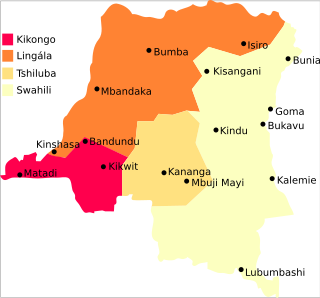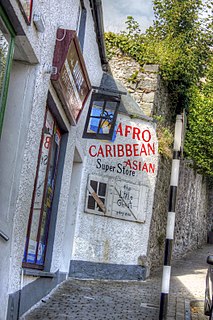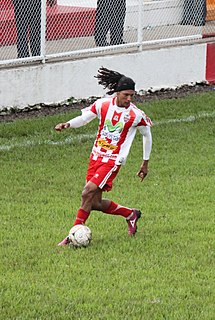The African diaspora consists of the worldwide collection of communities descended from native sub-Saharan Africans or people from Sub-Saharan Africa, predominantly in the Americas. Historically, ethnographers, historians, politicians and writers have used the term particularly to refer to the descendants of the West and Central Africans who were enslaved and shipped to the Americas via the Atlantic slave trade between the 16th and 19th centuries, with their largest populations in Brazil, the United States and Haiti. Some scholars identify "four circulatory phases" of this migration out of Africa. Prior to the Atlantic slave trade, the Arab slave trade also took many slaves from other parts of Africa, selling them to markets in North Africa and the Middle East.
Creole people are ethnic groups which originated during the colonial era from racial mixing mainly between Africans and Europeans and sometimes South Asian and Native American peoples, known as creolisation. Creole peoples vary widely in ethnic background and mixture, and many have since developed distinct ethnic identities. The development of creole languages is sometimes mistakenly attributed to the emergence of creole ethnic identities; however, they are independent developments.
Black music is an umbrella term that organizes music created, produced, or inspired by black people, people of African descent, including African music traditions and African popular music as well as the music genres of the African diaspora, including Afro-Caribbean music, Afro-Latino music, Afro-Brazilian music and African American music. These genres include negro spiritual, gospel, rumba, blues, bomba, jazz, salsa, R&B, samba, rock and roll, calypso, soul, cumbia, funk, ska, reggae, dub reggae, house, detroit techno, hip hop, gqom, afrobeat, funk carioca, and country.

Kongo or Kikongo is one of the Bantu languages spoken by the Kongo and Ndundu people living in the tropical forests of the Democratic Republic of the Congo, the Republic of the Congo and Angola. It is a tonal language. It was spoken by many of those who were taken from the region and sold as slaves in the Americas. For this reason, while Kongo still is spoken in the above-mentioned countries, creolized forms of the language are found in ritual speech of Afro-American religions, especially in Brazil, Cuba, Puerto Rico, Dominican Republic and Haiti. It is also one of the sources of the Gullah language and the Palenquero creole in Colombia. The vast majority of present-day speakers live in Africa. There are roughly seven million native speakers of Kongo, with perhaps two million more who use it as a second language.
Afro-Trinidadians and Tobagonians are people from Trinidad and Tobago who are largely of West African and Sub-Saharan descent. Social interpretations of race in Trinidad and Tobago are often used to dictate who is of African descent. Mulatto-Creole, Zambo, Pardo, Quadroon or Octoroon were all racial terms used to measure the amount of African ancestry someone possessed in Trinidad and throughout Latin American and Caribbean history.

Afro-Caribbeans or African Caribbeans are Caribbean people whose ancestors were taken from Africa via the trans-Atlantic slave trade to the Caribbean Islands between the 15th and 19th centuries to work primarily on various sugar plantations and in domestic households. Other names for the ethnic group include Black Caribbean, Afro- or Black West Indian, or Afro- or BlackAntillean. The term Afro-Caribbean was not coined by West Indians themselves but was first used by Americans in the late 1960s.
Abakuá, also sometimes known as Nañigo, is an Afro-Cuban men's initiatory fraternity or secret society, which originated from fraternal associations in the Cross River region of southeastern Nigeria and southwestern Cameroon.
Cape Verdean Americans are Americans whose ancestors were Cape Verdean.
Afro-Seminole Creole (ASC) is a dialect of Gullah spoken by Black Seminoles in scattered communities in Oklahoma, Texas, and Northern Mexico.
Creolization is the process in which creole cultures emerge in the New World. As a result of colonization there was a mixture among people of Indigenous American, West African and European descent, which came to be understood as Creolization. Creolization is traditionally used to refer to the Caribbean; although not exclusive to the Caribbean it can be further extended to represent other diasporas. The mixing of people brought a cultural mixing which ultimately led to the formation of new identities. Furthermore, creolization occurs when participants select cultural elements that may become part of or inherited culture. Robin Cohen states that creolization is a condition in which "the formation of new identities and inherited culture evolve to become different from those they possessed in the original cultures," and then creatively merge these to create new varieties that supersede the prior forms.

Louisiana Creole people, are persons descended from the inhabitants of colonial Louisiana during the period of both French and Spanish rule. Louisiana Creoles share cultural ties such as the traditional use of the French and Louisiana Creole languages and predominant practice of Catholicism.

Robert Farris Thompson is an American historian and writer specialising in the art of Africa and the Afro-Atlantic world. He has been a member of the faculty at Yale University since 1965 and currently serves as the Colonel John Trumbull Professor of the History of Art. Thompson coined the term "black Atlantic" in his 1983 book Flash of the Spirit: African and Afro-American Art and Philosophy - the expanded subject of Paul Gilroy's book The Black Atlantic.
Mauritians of African origin, more commonly known as Mauritian Creole people are Mauritians of partial or total East African descent. Their ancestors were slaves who were brought to work on the French sugar plantations. Nowadays, most creoles also have French and Indian blood. Rodriguais & Chagossians are usually incorporated within the creole ethnic group.
Indo-Grenadians or Grenadians who trace their roots to India, form the largest minority group in Grenada. This term is not generally recognized by Grenadians or indeed Caribbeans. They usually refer to themselves simply as Grenadian or possibly Caribbean. This group was first introduced during the second half of the 19th century when Grenada experimented with indentured labour. By the second half of the 20th century Indians were so integrated into Grenada’s society that a distinct Indian cultural identity was generally invisible. In addition, Indians were involved in every aspect of Grenadian life. Currently there are over 12,000 Grenadians of Indian and mixed-Indian descent.

Afro-Asians are African communities that have been living in the Indian Subcontinent for hundreds of years and have settled in countries such as India, Pakistan and Sri Lanka.

Haitians are the citizens of Haiti and their descendants in the Haitian diaspora.

Afro-Nicaraguans are Nicaraguans of African descent in Nicaragua. They make up 9% of the population and they're the largest group of African descent in in Central America. Numbering almost 600,000, according to the CIA factbook (2011), they primarily live on the southeastern coast, the Mosquito Coast, Bluefields and Managua. Creoles are from the Anglo-Caribbean and speak a dialect of Jamaican patois known as Miskito Coast Creole. Nicaragua also has a Garifuna population.
Yoruba Americans are Americans of Yoruba descent. The Yoruba people are an ethnic group originating in southwestern Nigeria and southern Benin in West Africa.








